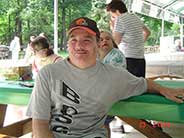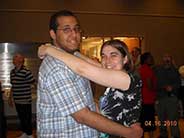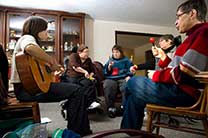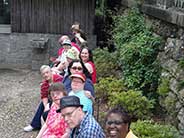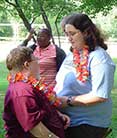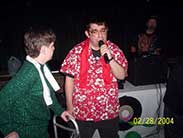Housekeeping and maintenance can be complicated with family directed housing. Communication, organization, and attention to detail will help prevent conflict and make the home’s daily life run more smoothly.
Parents must communicate and decide specifically who will perform each necessary task, not just assume that staff or a provider agency will do it all. A list of required tasks, including the responsible person and a deadline, often works efficiently. Both support staff and families need copies of the list.
Set guidelines for making joint decisions regarding housekeeping and maintenance. This can include any major/complex task, expensive purchase or service, or repair that would interrupt residents’ lives.
Involve your child and the housemates. In addition to helping them work through the transition, this process instills a positive sense of ownership in the home. Working together also allows them to become better acquainted with each other and encourages direct support staff to get to know the residents and their families.
Daily Necessities
In addition to items that all homes need, some may be unique to a home with support services:
House keys for residents, support staff, and managers. You may also opt for keyless systems, or a lock box with keypads mounted near an outside entrance to make one key accessible to staff. Decide how both family and support staff will access the home.
A unified system for managing funds. Establish a household account as well as separate accounts for each person living in the home. Families must decide who will have access to the funds. It is helpful to staff if each resident’s funds are set up in the same manner.
Storage for support staff. Discuss these needs with staff members to optimize their care for the individuals in the home. Storing records and other work supplies may require a locked cabinet for confidentiality.
Safety items. Some funding sources may require safety items such as fire extinguishers. Health and Safety
Mandated postings. Regulations may mandate posting such items as evacuation plans, employment law posters, and so on.
Change of address. Transportation and other service providers need to know about the individual’s new address.
A space for medications and medical supplies. The group may opt to keep medical supplies separate for each person living in the home or together in a central location. This storage area may require a locked cabinet.
Responsibility for Repairs & Upkeep
Finally, all the parents must have a clear understanding of who is responsible for repairs and upkeep. One person needs to take responsibility, because often when responsibility is shared, nothing gets done.
Rentals/Condos/Neighborhoods: When a child is renting, the lease should clearly spell out the landlord’s and tenant’s responsibilities. In a condominium, the association’s and the owner’s duties should be clear. Also, in some neighborhoods, neighborhood associations or city ordinances regulate standards for upkeep of single-family homes and other buildings.
You also need to clarify the duties of support staff. If you are paying support staff directly (without public funding), you can decide what household maintenance is the staff’s responsibility. This should be put in writing and clearly explained upfront. In contracting with a provider agency, the contract should specify what household maintenance the staff will be expected to handle.
Funding such as Supported Living and Medicaid Waiver funding do not necessarily cover maintenance of the home; funds for support services are separate from housing costs. Government funding, that is, will pay for supporting the individual in the home, but not necessarily for maintaining the home itself.
For example, homemaker personal care services under the Medicaid waiver will pay for staff to assist a resident in housekeeping tasks such as vacuuming and dusting. So, only household maintenance tasks in which the child can participate can be paid for with government funds. Larger tasks such as washing windows, cleaning carpets, etc. need to be completed in other ways.
Deciding What Needs to Be Done
Make a list of what routine tasks will need to be completed and how often they should be done. The list should also include routine maintenance needed in the home. It should be clear which tasks a condominium association, landlord, or the home’s residents will complete with assistance from the support-service staff. Then, families need to decide who will complete the remainder of the tasks and how to pay for the work.
Maintenance Tasks
Here are some of the routine maintenance tasks for which you need to plan:
- Minor and major repairs (e.g., fixing a window to renovating a bathroom)
- Routine maintenance (e.g., painting)
- Outside clean-up of windows and gutters
- Snow removal
- Grass cutting
- Raking leaves
- Landscaping
- Pest control
- Hiring a locksmith
- Plumbing
- Electrical work
- Sewer cleaning
- Heating and air conditioning
- Hiring a general handyman
Housekeeping and Decorating
While the style and decorating should reflect the personalities of the people living in the home, comfort and easy housekeeping are also important considerations.
Parents often comment that direct support staff are not as attentive to cleaning and caring for the home as they would like. These parents advise purchasing durable, simple, and easy-to-clean furnishings.
These things will make the home safer and easier to care for:
- Area rugs and mats with non-skid backing
- Washable wall coverings (i.e., semi-gloss paint), especially in kitchen/baths
- Washable window treatments
- Well-maintained and clean exhaust fans in bathrooms and kitchen
- Stove with front controls
- Furniture that can withstand heavy use, upholstered in a washable fabric
- Hard flooring in kitchen or entrances
- No cloth-covered dining chairs
Keep a notebook containing reference information about the products and appliances in the home. This information should include the warranties, care, and use of major appliances.
Make sure housekeeping instructions are simple, and the support staff knows where the information is kept.
Completing Tasks Yourself
You may choose to take care of home-maintenance tasks yourself. This can certainly save money and can be a significant contribution that skilled family members can make.
If you choose to do the work, make sure that:
- Those volunteering their services should have the skills needed to complete the task, including proper licensing and permits if required.
- Agreements about family members completing tasks are added to the written contract that the group signs, including deadlines and alternative solutions if the deadlines cannot be met.
- A contingency plan is in place for completing tasks if the family member/volunteer is not able to do the work
WARNING: Keep the House at Its Best
You may already have a high standard for the safety, cleanliness, and appearance of your child’s home. Neighbors, however, may closely scrutinize a home for people with disabilities, especially in situations where neighbors have already expressed resistance. Neighbors often use small problems with upkeep as evidence to support their objections.



